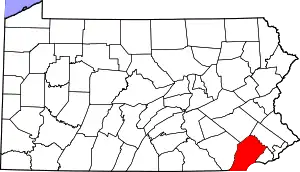Valley Forge, Pennsylvania
The Village of Valley Forge is an unincorporated settlement. It is located on the west side of Valley Forge National Historical Park at the confluence of Valley Creek and the Schuylkill River in Pennsylvania. The remaining village is in Schuylkill Township of Chester County. It once spanned Valley Creek into Montgomery County. The name Valley Forge is often used to refer to anywhere in the general vicinity of the park. Many places will use the name even though they are actually in King of Prussia, Trooper, Oaks, and other nearby communities. This leads to some ambiguity on the actual location of the modern village. There is a partial re-creation of the historic village from the time of the American Revolution that is located just within the outskirts of the park.
Valley Forge, Pennsylvania | |
|---|---|
 George Washington's headquarters in Valley Forge | |
 Valley Forge Location within the U.S. state of Pennsylvania  Valley Forge Valley Forge (the United States) | |
| Coordinates: 40°5′49″N 75°28′12″W | |
| Country | United States |
| State | Pennsylvania |
| County | Chester |
| Township | Schuylkill |
| Time zone | UTC-5 (Eastern (EST)) |
| • Summer (DST) | UTC-4 (EDT) |
| ZIP codes | 19481, 19482, 19484, 19493–19496 |
| Area code(s) | 610 and 484 |
Mount Joy and Valley Forges
In 1751, there was a forge at the mouth of the East Valley creek used to convert pig-iron into bar-iron. It was advertised for sale as the property of Daniel Walker, Stephen Evans, and Joseph Williams. It was originally called Mount Joy forge, but it came to be known as Valley Forge. The pig-iron used at Valley Forge was hauled from Warwick furnace. The British burned it in September 1777, and George Washington entrenched the Continental Army in December on the Montgomery County side of Valley creek, opposite Valley Forge. General Washington's headquarters were established at the substantial stone house of Isaac Potts. After the Revolutionary War, another Valley Forge was built on the other side of Valley creek; it was in ruins in 1816.[1]
See also
References
- James M. Swank, The Iron and Steel Industries of Pennsylvania, Annual Report of the Secretary of Internal Affairs of the Commonwealth of Pennsylvania (1883) Part III, Industrial Statistics, Vol. X 1881-82, Report of the Bureau of Industrial Statistics, Legislative Document, No. 7, pp. 20-21.
